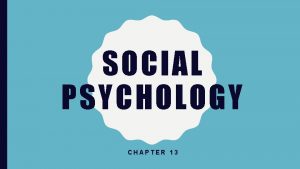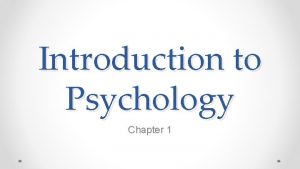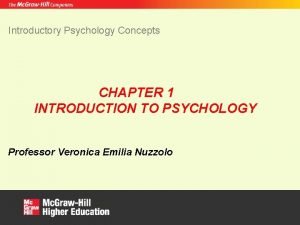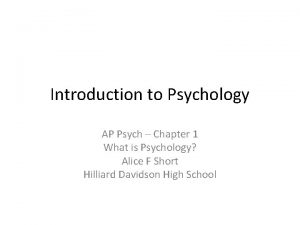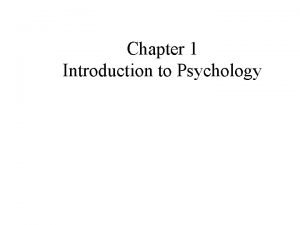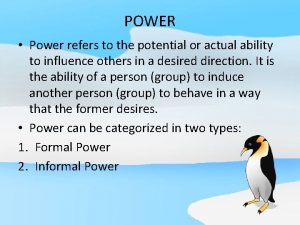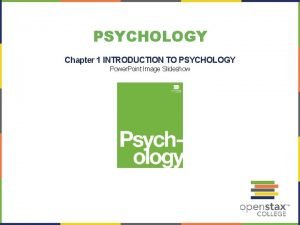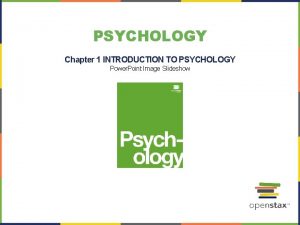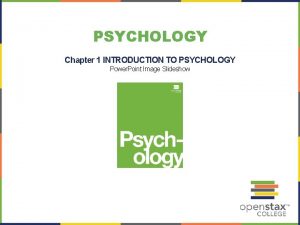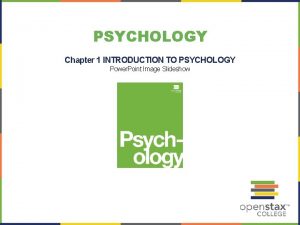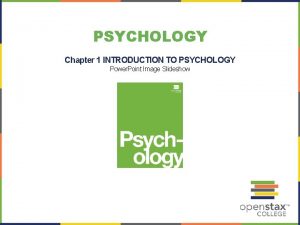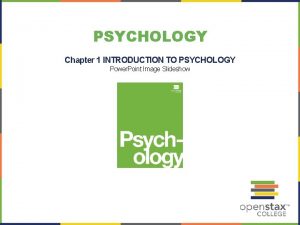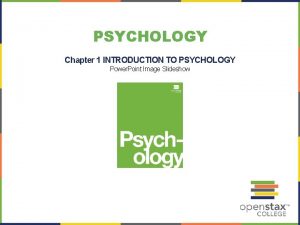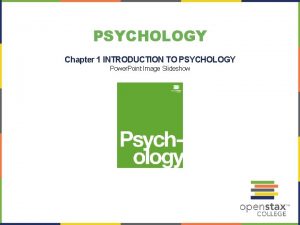PSYCHOLOGY Chapter 1 INTRODUCTION TO PSYCHOLOGY Power Point



































- Slides: 35

PSYCHOLOGY Chapter 1 INTRODUCTION TO PSYCHOLOGY Power. Point Image Slideshow

WHY ARE YOU TAKING THIS COURSE?

WHAT CAREERS USE PSYCHOLOGY AND HOW?

As you enter the job market, consider jobs that require the skills you obtained during your psychology education. These abilities include: Critical thinking One-on-one and small group communication Effective written communication skills Understanding of individual human behavior Knowledge of group and organizational behavior Creative thinking skills Careers: Teacher, Human Resources, Advertising Agent, Doctor, Counselor, Lawyer, Journalist, Police Officer, Research Assistant, Nurse, Animal Trainer

WHEN YOU HEAR THE WORD PSYCHOLOGY, WHAT COMES TO MIND? 5

WHEN YOU HEAR THE WORD SCIENCE, WHAT COMES TO MIND? 6

SCIENCE The systematic process by which we gain new knowledge using an establish method 7

PSYCHOLOGY Psychology: The scientific investigation of behavior and mental processes Behavior: overt actions that others can directly observe � Mental processes: private thoughts, emotions, feelings, and motives that cannot be directly observed � 8

PSEUDOSCIENCE A discipline or approach that pretends to be or has a close resemblance to science 9

WHAT PURPOSE DO PSYCHOLOGY AND SCIENCE SERVE? Psychology helps us scientifically evaluate assumptions or claims about behaviors and mental processes through experiments and observations 10

CAN YOU IDENTIFY WHICH OF THE ASSUMPTIONS ON THE FOLLOWING SLIDES ARE TRUE OR FALSE? 11

TRUE OR FALSE The best way to learn and remember information is to “cram, ” or study it intensively during one concentrated period. 12

FALSE! Research shows this is the worst way to prepare for an exam! Students who cram often perform more poorly than those who do not study at all (Wheeler, 2012) 13

TRUE OR FALSE Misery loves company 14

TRUE! Research shows depressed people are more likely to seek emotional support from persons who are also depressed (Ambady, 2011) 15

CONCLUSION You can’t just assume your beliefs are true. You need to have evidence! The information that you learn in this class – whether it will be on feelings, memory, language, mental illness – all of it is based upon the scientific method. Psychologists are scientists! 16

PSYCHE + SCIENCE = PSYCHOLOGY Psyche: - Aristotle used the term psyche to refer to the essence of life - means “mind” in Greek - emphasis on observation is basis for methods of contemporary science

FOUNDING THE SCIENCE OF PSYCHOLOGY (CONT. ) Behaviorism and social learning theory - Ivan Pavlov: - classical conditioning - John B. Watson - Little Albert

FOUNDING THE SCIENCE OF PSYCHOLOGY (CONT. ) Behaviorism and social learning theory (cont. ): social learning theory: - Albert Bandura: - most important aspects of our behavior are learned from other persons in society

FOUNDING THE SCIENCE OF PSYCHOLOGY (CONT. ) (a) B. F. Skinner is famous for his research on operant conditioning. (b) Modified versions of the operant conditioning chamber, or Skinner box, are still widely used in research settings today. (credit a: modification of work by "Silly rabbit"/Wikimedia Commons)

FOUNDING THE SCIENCE OF PSYCHOLOGY (CONT. ) Functions of the conscious mind: • cognitive psychology: - perceiving, believing, thinking, remembering knowing, deciding, etc.

FOUNDING THE SCIENCE OF PSYCHOLOGY (CONT. ) Functions of the conscious mind: Cognitive-behavioral therapists take cognitive processes and behaviors into account when providing psychotherapy. This is one of several strategies that may be used by practicing clinical psychologists.

FOUNDING THE SCIENCE OF PSYCHOLOGY (CONT. ) (a) Sigmund Freud was a highly influential figure in the history of psychology. (b) One of his many books, A General Introduction to Psychoanalysis, shared his ideas about psychoanalytical therapy; it was published in 1922.

FOUNDING THE SCIENCE OF PSYCHOLOGY (CONT. ) Nature of the “unconscious mind”: psychoanalysis: - Sigmund Freud: - unconscious mind - emotional conflicts - motives: - sexual - aggressive

FOUNDING THE SCIENCE OF PSYCHOLOGY (CONT. ) Nature of the “Unconscious Mind” (cont. ): - Humanistic psychology: - Abraham Maslow - Carl Rogers - Viktor Frankl: • - self-concept

FOUNDING THE SCIENCE OF PSYCHOLOGY (CONT. ) Nature of the “Unconscious Mind” (cont. ): -Carl Rogers, shown in this portrait, developed a client-centered therapy method that has been influential in clinical settings. (credit: "Didius"/Wikimedia Commons)

FOUNDING THE SCIENCE OF PSYCHOLOGY (CONT. ) Personality: Each of the dimensions of the Five Factor model is shown in this figure. The provided description would describe someone who scored highly on that given dimension. Someone with a lower score on a given dimension could be described in opposite terms.

FOUNDING THE SCIENCE OF PSYCHOLOGY (CONT. ) Social Psychology: Stanley Milgram’s research demonstrated just how far people will go in obeying orders from an authority figure. This advertisement was used to recruit subjects for his research.

FOUNDING THE SCIENCE OF PSYCHOLOGY (CONT. ) The biopsychosocial model suggests that health/illness is determined by an interaction of these three factors.

CONTEMPORARY PERSPECTIVES AND SPECIALTY AREAS IN PSYCHOLOGY Sociocultural perspective: • Derived from social anthropology • Cultural relativity • Diversity

CONTEMPORARY PERSPECTIVES AND SPECIALTY AREAS IN PSYCHOLOGY Sociocultural perspective: Gesture: Thumbs up What you think it means: "It's all good!" What it means in Thailand: A serious sideeye (or similar). Some say it's very offensive, while others contend it's more childish than obscene, like sticking your tongue out. Best just to play it safe and keep your hands in your pockets.

CONTEMPORARY PERSPECTIVES AND SPECIALTY AREAS IN PSYCHOLOGY Sociocultural perspective: Gesture: Giving something with your left hand What you think it means: "I'm giving you something. . . and I just happen to be using my left hand" What it means in many parts of the world: In a lot of Asia, Africa, and the Middle East, the left hand is strictly reserved for wiping one's @ss, while the right hand is used for just about everything else. So handing someone an item with your pooping hand's pretty inconsiderate -- who says lefties are smarter?

CONTEMPORARY PERSPECTIVES AND SPECIALTY AREAS IN PSYCHOLOGY (CONT. ) Relationship between psychiatry and psychology: - Psychiatrists: M. D. can prescribe drugs - Psychologists: Ph. D or Psy. D not licensed to prescribe drugs in most states

CONTEMPORARY PERSPECTIVES AND SPECIALTY AREAS IN PSYCHOLOGY (CONT. ) Doctoral degrees are generally conferred in formal ceremonies involving special attire and rites. (credit: Public Affairs Office Fort Wainwright)

FIGURE 1. 19 Individuals earning a Ph. D in psychology have a range of employment options.
 The real lesson 21
The real lesson 21 Power bi training powerpoint
Power bi training powerpoint Point point power
Point point power Altruism
Altruism Introduction to psychology chapter 1
Introduction to psychology chapter 1 Introduction to psychology chapter 1
Introduction to psychology chapter 1 Introduction to psychology chapter 1
Introduction to psychology chapter 1 Introduction to psychology chapter 1
Introduction to psychology chapter 1 Solar power satellites and microwave power transmission
Solar power satellites and microwave power transmission Potential power
Potential power Flex28024a
Flex28024a Dispersive power is directly proportional to
Dispersive power is directly proportional to Power of a power property
Power of a power property General power rule
General power rule Power angle curve in power system stability
Power angle curve in power system stability Power delivered vs power absorbed
Power delivered vs power absorbed Evangelio del domingo en power point
Evangelio del domingo en power point Aplausos sonido
Aplausos sonido La boutique del power point
La boutique del power point Ppt tennis
Ppt tennis Tm pp
Tm pp Powerpoint sul riciclo scuola media
Powerpoint sul riciclo scuola media Proposal alat peraga matematika
Proposal alat peraga matematika Powerpoint sekolah sabat
Powerpoint sekolah sabat Barni
Barni La boutique del power point
La boutique del power point La boutique del power point
La boutique del power point La boutique del powerpoint
La boutique del powerpoint Gizi kuliner
Gizi kuliner Decreto 1330
Decreto 1330 Powerpoint
Powerpoint Presentación de un portafolio estudiantil ejemplo
Presentación de un portafolio estudiantil ejemplo Cara mengoperasikan microsoft power point
Cara mengoperasikan microsoft power point Como poner potencias en power point
Como poner potencias en power point Power point advantages
Power point advantages Ventajas y desventajas de power point
Ventajas y desventajas de power point



